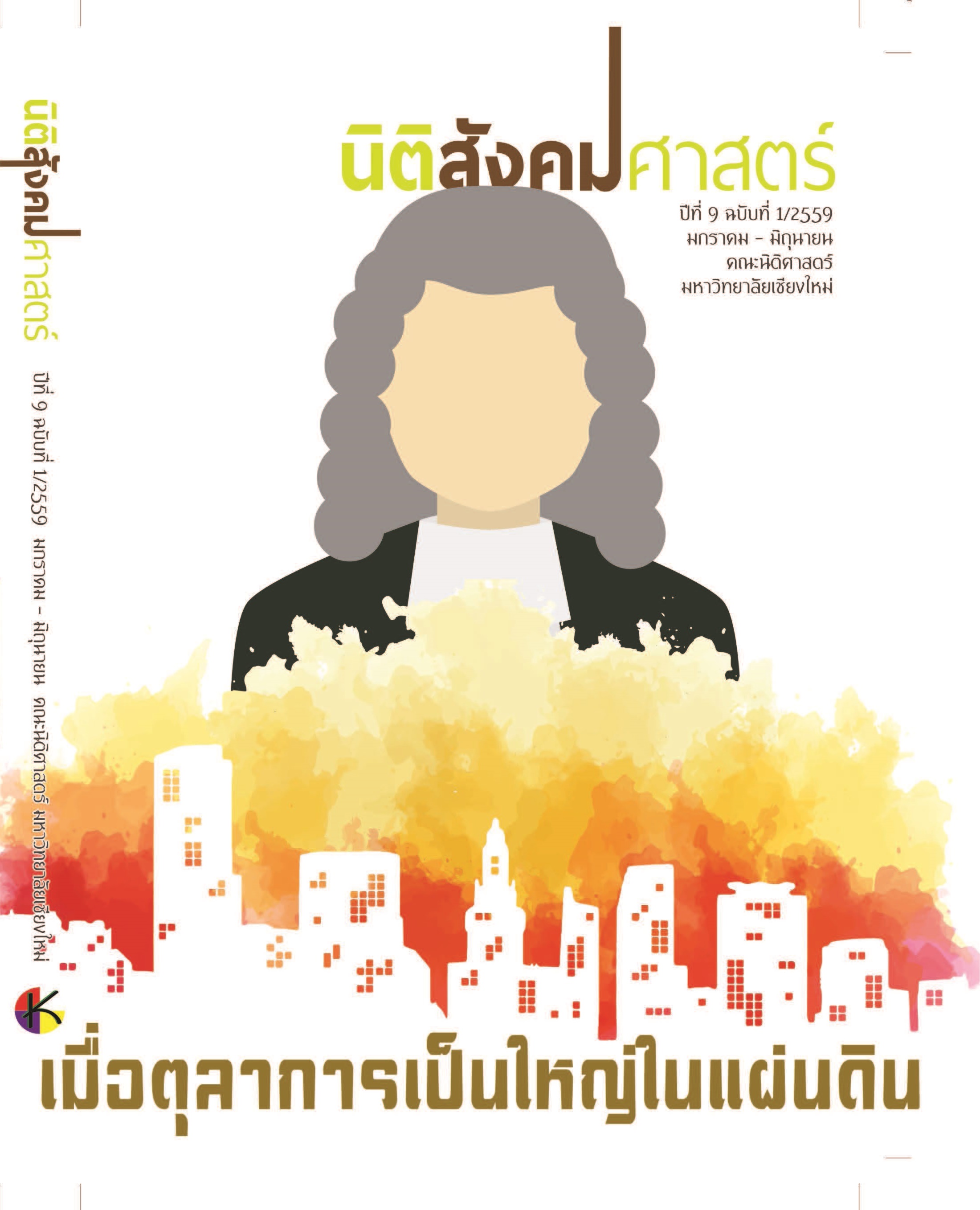การเมืองเชิงตุลาการ Judicialization of Politics
Main Article Content
บทคัดย่อ
นับตั้งแต่ภายหลังสงครามโลกครั้งที่ 2 เป็นต้นมา ได้เกิดความเปลี่ยนแปลง เกี่ยวกับบทบาทของฝ่ายตุลาการอย่างสำคัญ การจัดทำรัฐธรรมนูญของหลายประเทศ ที่เกิดขึ้นในห้วงเวลานี้ได้มีการจัดตั้งศาลรัฐธรรมนูญขึ้นมาทำหน้าที่ชี้ขาดข้อพิพาทที่ เกี่ยวข้องกับรัฐธรรมนูญ ซึ่งการทำหน้าที่ของศาลรัฐธรรมนูญในลักษณะนี้ได้ขยาย ขอบเขตไปอย่างกว้างขวาง ทั้งประเด็นเรื่องสิทธิเสรีภาพของประชาชน การปกป้อง สิทธิของชนกลุ่มน้อย การคุ้มครองสิ่งแวดล้อม และเฉพาะอย่างยิ่งกับปัญหาความขัด แย้งทางการเมือง ซึ่งปรากฏการณ์ดังกล่าวนี้ถูกเรียกว่าเป็น “การเมืองเชิงตุลาการ”
การขยายบทบาทของฝ่ายตุลาการได้ถูกทำให้เกิดการตั้งคำถามในด้าน ของแนวคิดและผลกระทบที่เกิดขึ้นในความเป็นจริง ในด้านของแนวคิดจะพบว่า การเมืองเชิงตุลาการมีความแตกต่างไปอย่างมากจากแนวความคิดเรื่องหลักการ แบ่งแยกอำนาจ ซึ่งบทบาทหน้าที่ของฝ่ายตุลาการจะถูกจำกัดไว้เพียงการวินิจฉัย ประเด็นปัญหาทางกฎหมายในข้อพิพาทต่างๆ ขณะที่การศึกษาถึงผลที่เกิดขึ้นจริง ก็จะพบว่าการทำหน้าที่ของฝ่ายตุลาการในลักษณะดังกล่าวนี้ไม่เพียงส่งผลกระทบต่อ การส่งเสริมสิทธิเสรีภาพของประชาชนเท่านั้น หากยังสามารถทำให้เกิดปัญหา ในทางการเมืองติดตามมาด้วยเช่นกัน
Since World War II, there is a significant change on the role of the judicial power. Postwar constitutions recognize the establishment of special constitutional courts to safeguard the constitutional rights. Constitutional court jurisdiction expands extensively including the people’s rights, environmental protection and political conflict. This incident is widely known as “judicialization of politics”.
The expansion of the judicial power leads to the conceptual question and the “de facto” effect. Concept of judicialization of politics is different from the idea of separation of powers in which the role of judiciary limits to legal problem. But the concept of judicialization of politics advocates the role of the judicial powers. However, there are many studies suggests that the role of judiciary not only create the positive but also the negative effect in the politics.
Article Details
O ความคิดเห็นใดๆ ที่ลงตีพิมพ์ใน CMU Journal of Law and Social Sciences เป็นของผู้เขียน (ความคิดเห็นใดๆ ของผู้เขียน กองบรรณาธิการ CMU Journal of Law and Social Sciences ไม่จำเป็นต้องเห็นด้วย)
O กองบรรณาธิการ CMU Journal of Law and Social Sciences ไม่สงวนสิทธิ์ในการคัดลอกแต่ให้อ้างอิงแหล่งที่มาด้วย
เอกสารอ้างอิง
Book
Bjorn Dressel (ed.), The Judicialization of Politics in Asia. New York: Routledge, 2012.
Tom Ginsburg, Judicial Review in New Democracies. New York: Cam¬bridge University Press, 2003.
Article
Barry Friedman, A History of the Countermajoritarian Difficulty, Part One: The Road to Judicial Supremacy, N.Y.U. Law Review 333 vol. 73 (1998).
Barry Friedman, Dialogues and Judicial Reviews, 91 Michigan Law Review 577 (1993).
Bruce Ackerman, The Rise of World Constitutionalism, 83 Virginia Law Review 789, (1997).
Mark Tushnet, Law and Prudence in the Law of Justiciability: The Transformation and Disappearance of the Political Question Doctrine, 80 N.C. Law Review (2002) 1203.
Rafael Gely and Pablo Spiller, The Political Economy of Supreme Court Constitutional Decisions: The Case of Roosevelt’s Court-Packing Plan, 12 International Review of Law and Eco¬nomics 45 (1992).
Ran Hirschl, The New Constitutionalism and the Judicialization of Pure Politics Worldwide, Fordham Law Review vol. 75 Issues 2.
Ran Hirschl, Toward Juristocracy: The Origins and Consequences of the New Constitutionalism (Cambridge: Cambridge University Press, 2004).
Richard Hasen, A Critical Guide to Bush v. Gore Scholarship, Annual Review of Political Science volume 7 (2004).
Richard Posner, Is the Ninth Circuit Too Large? A Statistical Study of Judicial Quality, Journal of Legal Studies 711 (2000).
William Eskridge, “The Judicial Review Game,” 88 Northwestern University Law Review 382 (1993).
Youngjae Lee, Law, Politics, and Impeachment: The Impeachment of Roh Moo-hyun from a Comparative Constitutional Perspective, 53 American Journal Comparative Law , 403 (2005).

